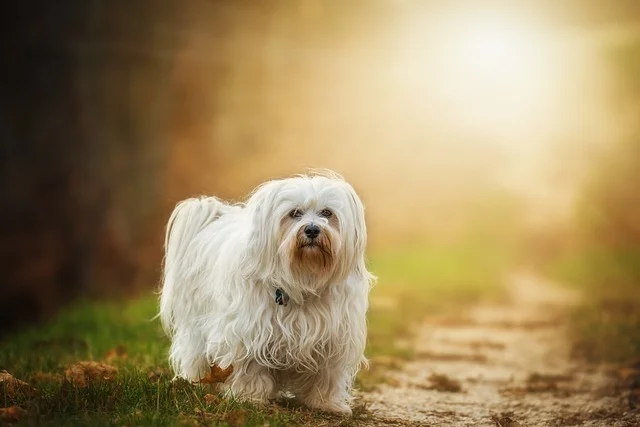When it comes to bringing a new pet into a family with children, it’s crucial to consider a breed that is known for its compatibility with kids. Havanese dogs, with their playful nature, gentle demeanor, and affectionate personalities, make excellent companions for children. In this article, we will explore the unique qualities of Havanese dogs. How they can contribute to building a strong bond with children.
Understanding the Havanese Breed

The Havanese is a small and sturdy breed originating from Cuba. They are known for their friendly and outgoing nature, making them an ideal choice for families with children. Havanese dogs have a soft, hypoallergenic coat, which is an added advantage for families with allergy concerns. They are small to medium-sized dogs with distinctive, silky coats that come in a variety of colors. Havanese dogs are highly adaptable and make excellent family pets.
What is so special about Havanese dogs?
Havanese dogs are special for several reasons.
- They have an adorable and affectionate nature, making them excellent companions.
- Their luxurious coat is hypoallergenic, making them suitable for allergy sufferers.
- Havanese dogs are known for their playful and energetic demeanor, bringing joy and liveliness to any household.
- They are intelligent and easily trainable, making them a delight to teach.
- Additionally, their small size and sturdy build make them adaptable to various living situations.
- Overall, Havanese dogs possess a unique combination of qualities that make them truly special and beloved by many.
Havanese Characteristics
| Characteristic | Description |
|---|---|
| Size | Small |
| Coat | Long, silky |
| Color | Various colors and patterns |
| Temperament | Friendly, affectionate, and intelligent |
| Lifespan | 14-16 years |
| Exercise Needs | Moderate, enjoys playtime |
| Grooming Requirements | High maintenance and regular brushing |
| Trainability | Quick learner, responds well to training |
| Health | Generally healthy breed; watch for issues |
Havanese dogs have a friendly and outgoing temperament. They are sociable dogs that get along well with people of all ages, including children. They are intelligent and eager to please, which makes them easy to train. Havanese dogs are known for their expressive eyes and lively personalities.
Personality Traits
Havanese dogs are known for being loving, loyal, and gentle. They thrive on human companionship and enjoy being part of the family. They are playful and enjoy engaging in activities with their owners. Havanese dogs have a moderate energy level, requiring daily exercise and mental stimulation to keep them happy and healthy.
Personality & History
Havanese dogs have a rich history dating back centuries. The Cuban aristocracy favored them, making these dogs popular pets in European countries. Today, they are known for their cheerful and outgoing personalities. Havanese dogs are adaptable to different living situations and thrive on love and attention from their owners. They make loyal and affectionate companions.
Breed Appearance

Havanese dogs have a distinctive appearance. They have a sturdy build with a slightly longer body than their height. Their coat is long, soft, and silky, often styled in various ways. They have a plumed tail that rests over their back. The breed’s head is proportionate to its body, and its eyes are round and expressive.
Female havanese temperament
Female Havanese dogs, just like the males, are usually loving, friendly, and playful. They really like being around people and other animals. They’re gentle, smart, and keen to make you happy. But each dog can be a bit different, so it’s important to help them meet lots of new things early on and teach them the right behaviors. That way, they can grow up to be their best selves.
Havanese height and length
In terms of height and length, Havanese dogs are generally small to medium-sized. According to breed standards, the ideal height for both males and females is between 9 to 11 inches (23 to 28 cm) at the shoulder. The length of their body is usually slightly longer than their height, resulting in a rectangular-shaped body. However, it’s worth mentioning that individual variations can occur within the breed.
Why Havanese Dogs Are Great with Children
Havanese dogs possess several traits that make them excellent companions for children. Firstly, they are known for their playful and energetic nature, always ready to engage in activities with their young human counterparts. Additionally, Havanese dogs are generally patient and tolerant, which is essential when dealing with the unpredictable behavior of children.
Responsibilities of Owning a Havanese Dog

Before bringing a Havanese dog into a household with children, it’s crucial to understand the responsibilities that come with pet ownership. These responsibilities include providing proper nutrition, regular exercise, grooming, and healthcare. It is also important to create a safe and comfortable environment for both the dog and the children.
Introducing a Havanese Dog to Children
When introducing a Havanese dog to children, it’s essential to take gradual steps. Start by allowing supervised interactions in a calm and controlled environment. This will give both the dog and the children a chance to familiarize themselves with each other.
Building Trust and Confidence
Building trust and confidence between a Havanese dog and children is a key factor in establishing a strong bond. Encourage gentle and respectful interactions, and teach children to approach the dog calmly and without sudden movements. Reward positive behavior from both the dog and the children to reinforce a sense of trust.
Supervising Interactions
While Havanese dogs are generally great with children, it’s important to supervise their interactions to ensure safety for both parties. Always keep an eye on their playtime, and intervene if necessary to prevent any rough handling or accidental harm.

Encouraging Play and Exercise
Play and exercise are essential for both Havanese dogs and children. Encourage physical activities that involve the dog, such as playing fetch or going for walks together. This not only helps with bonding but also keeps both the dog and the children physically active and mentally stimulated.
Teaching Children to Care for their Havanese
Teaching children to take responsibility for their Havanese dog helps instill a sense of ownership and empathy. Assign age-appropriate tasks, such as feeding, grooming, and basic training, to the children. This not only strengthens the bond between the child and the dog but also teaches important life skills.
Educating Children about Dog Safety
It is crucial to educate children about dog safety to ensure a harmonious relationship. Teach them how to read a dog’s body language, recognize signs of discomfort, and understand the importance of giving the dog space when needed. This knowledge will help prevent accidents and promote a safe environment for the dog and the children.
Handling Challenges and Resolving Conflicts
Despite the best intentions, challenges and conflicts may arise between a Havanese dog and children. It is important to address these issues promptly and calmly. Teach children good communication skills and guide them on appropriate ways to handle conflicts, ensuring a positive and respectful relationship.
Benefits of the Havanese-Child Bond
The bond between a Havanese dog and children can have numerous benefits. It provides children with a loyal and loving companion who can be a source of comfort and emotional support. The bond also teaches children valuable life lessons such as responsibility, empathy, and compassion.
Creating Lifelong Memories
Growing up with a Havanese dog can create lasting memories for children. From shared adventures and playtimes to cuddles and unconditional love, the bond formed between a Havanese dog and children can be cherished for a lifetime.
Havanese Care, Diet, Coat, Training, and Socialization
Havanese dogs are adorable and affectionate companions that need proper care. Havanese required a balanced diet, grooming for their luxurious coats, consistent training, and sufficient socialization. Here’s a detailed guide on how to provide the best care for your Havanese dog.
Havanese Care
Proper care is essential for the well-being of your Havanese dog. Ensure they have a comfortable and safe living environment, including a cozy bed and access to clean water at all times. Havanese dogs are generally a healthy breed, but they can be prone to certain health issues. These may include luxating patellas, cataracts, hip dysplasia, and heart conditions. Regular veterinary check-ups, a balanced diet, exercise, and proper grooming are important for their overall well-being.
Regular vaccinations and parasite prevention are crucial for their health. Brush their teeth regularly, trim their nails, and clean their ears to maintain overall hygiene.
Havanese Dogs Diet
A nutritious diet is vital to keep your Havanese dog healthy and energetic. Provide them with high-quality dog food that is appropriate for their age, size, and activity level. Ensure the food contains essential nutrients such as protein, carbohydrates, fats, vitamins, and minerals. Divide their meals into two or three portions to avoid overeating and digestive issues.
Havanese Coat

The Havanese breed is known for its long, silky coat. Regular grooming is necessary to keep their coat healthy and tangle-free. Brush their coat gently at least two to three times a week to prevent matting. Consider scheduling professional grooming sessions every four to six weeks to maintain the desired length and appearance. Regularly check for any skin issues or abnormalities, and consult a veterinarian if necessary.
Havanese Training
Consistent training is important to ensure the Havanese dog is well-behaved and obedient. Use positive reinforcement techniques such as treats, praise, and rewards to motivate and encourage good behavior. Start with basic commands like “sit,” “stay,” and “come.” Gradually progress to more advanced commands. Engage in mental stimulation activities such as puzzle toys or interactive games to keep them mentally sharp and engaged.
Havanese Socialization
Proper socialization from an early age is vital for Havanese dogs to develop good manners and be comfortable in various situations. Expose them to different environments, sounds, people, and other animals in a controlled and positive manner. Arrange playdates with well-behaved dogs to encourage healthy interactions. This will help prevent fear, anxiety, and aggression issues in the future.
Proper care, a balanced diet, regular grooming, consistent training, and adequate socialization are key factors in ensuring the well-being and happiness of your Havanese dog.
Fun Fact
- Havanese dogs are native to Cuba and were once considered a royal dog breed.
- They have a long history dating back to the 16th century, making them one of the oldest dog breeds in the world.
- Havanese dogs have a unique springy gait, which adds to their playful and energetic demeanor.
- They are excellent jumpers and have been known to perform impressive leaps, showcasing their agility.
- Havanese dogs are often skilled at learning tricks and performing in dog sports such as agility and obedience competitions.
- They have a natural talent for being therapy dogs due to their friendly and gentle nature.
- Havanese dogs are highly adaptable and can thrive in various environments, from city apartments to suburban homes.
- They are known for their expressive eyes and adorable facial expressions, which can melt hearts.
- Havanese dogs have a low-shedding coat, making them a good choice for individuals with allergies.
- They have a knack for entertaining their owners with their playful antics, and they love to be the center of attention.
These fun facts highlight some of the unique characteristics and qualities that make Havanese dogs a beloved and fascinating breed.
Is Havanese a good house dog?
Havanese dogs make excellent house dogs for several reasons. They are small in size, making them well-suited for apartment living or smaller homes. Their friendly and adaptable nature allows them to easily adjust to indoor environments. Havanese dogs are known for being well-behaved and rarely destructive, making them great companions for those concerned about their home’s condition. They are also hypoallergenic, which is a significant advantage for individuals with allergies. With their affectionate and gentle temperament, Havanese dogs thrive in a loving home environment, making them a wonderful choice as house dogs.
Do Havanese dogs bark a lot?
Havanese dogs have a tendency to bark, but their barking behavior can vary from dog to dog. Some Havanese dogs may be more vocal and inclined to bark frequently, while others may bark less. Barking can be a way for Havanese dogs to communicate, express excitement, or alert their owners. However, with proper training and socialization, you can help manage and control excessive barking behavior in Havanese dogs. It’s important to provide them with consistent guidance and teach them appropriate behaviors to minimize excessive barking and promote a harmonious living environment.
Which is better a Maltese or Havanese?
Deciding between a Maltese and a Havanese ultimately depends on your personal preferences and lifestyle. Both breeds have their own unique qualities.
Maltese dogs are known for their elegance and luxurious white coats. They are generally smaller in size compared to Havanese dogs. Maltese are affectionate and playful, and they tend to form strong bonds with their owners. They require regular grooming to maintain their beautiful coat.
On the other hand, Havanese dogs are slightly larger and have a range of coat colors and patterns. They are also affectionate and playful, making them great family pets. Havanese dogs are known for being good with children and other pets. They have a hypoallergenic coat and require regular grooming to prevent matting.
When choosing between a Maltese and a Havanese, consider factors such as size, coat maintenance, energy levels, and compatibility with your lifestyle and family dynamics. It’s recommended to spend time with both breeds, if possible, to see which one resonates with you more and fits well into your home and routine.
Frequently Asked Questions (FAQs)
-
Can Havanese dogs be left alone with children?
It is generally not recommended to leave any dog alone with young children. Supervision is crucial to ensure the safety of both the dog and the children.
-
Are Havanese dogs good for families with allergies?
Yes, Havanese dogs are considered hypoallergenic, as they have hair instead of fur, which reduces the likelihood of triggering allergies.
-
Do Havanese dogs require a lot of grooming?
Yes, Havanese dogs have long, luxurious coat that requires regular grooming to prevent matting and keep it clean and healthy.
-
At what age can a child start taking care of a Havanese dog?
The age at which a child can start taking care of a Havanese dog depends on their maturity level and the specific tasks involved. It is important to assign age-appropriate responsibilities and provide guidance.
-
Can Havanese dogs be trained easily?
Yes, Havanese dogs are intelligent and eager to please, which makes them generally easy to train. Consistency, positive reinforcement, and patience are key when training a Havanese dog.
Conclusion
Havanese dogs make great family pets, especially if you have kids. They’ve got all the right qualities to be loving companions. If you follow the tips in this article, you can help your Havanese dog and your kids become really close. The relationship they build will not only bring joy and companionship but also teach valuable life lessons and create beautiful memories that will last a lifetime. These delightful dogs bring joy and companionship to their families and continue to be cherished pets around the world.





Leave a Comment
You must be logged in to post a comment.